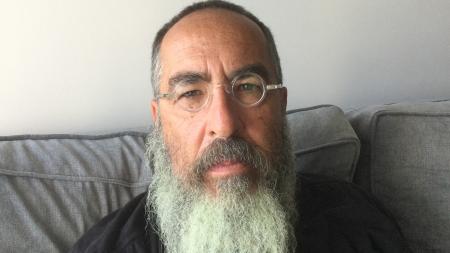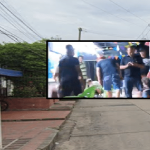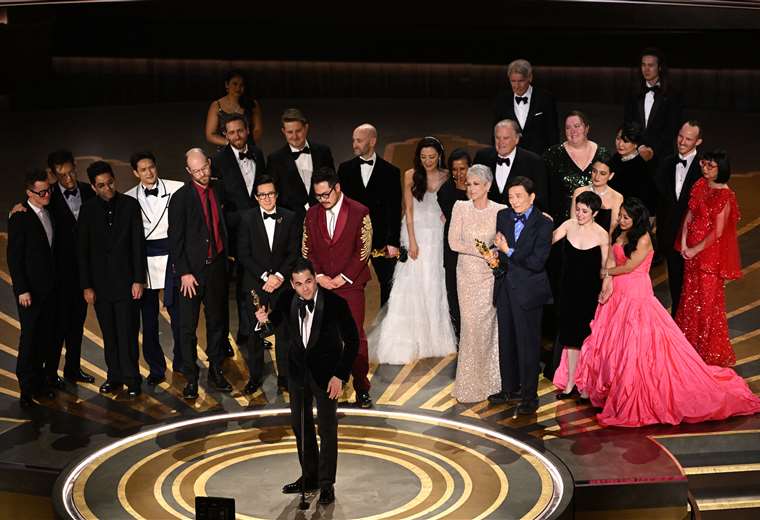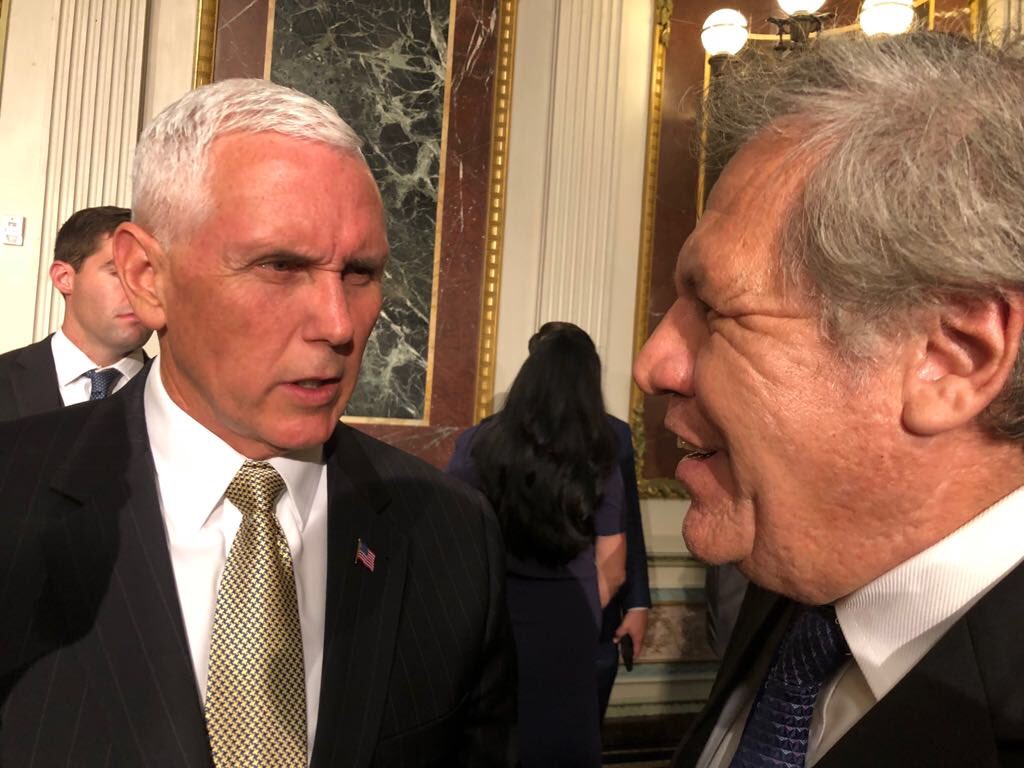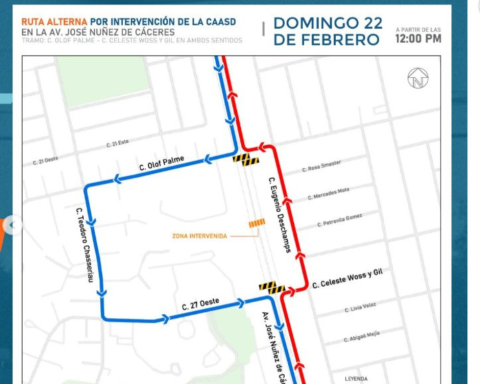Religious leaders of the Muslim, Jewish, Armenian Apostolic and Evangelical communities in Argentina highlighted the “humility” and “openness” of Pope Francis towards all religions, They defined him as an “ally”, “guarantor of peace and interreligious dialogue” and “world leader” At the same time, they recounted the changes brought about by their actions since their pontificate, which will be 10 years old tomorrow.
from judaism
“I think we still do not understand the historical significance that the Pope is going to have. We have not yet had time to metabolize all his actions, but he is making great changes in the world and these changes must be supported and pondered,” he began by telling Télam ehe spiritual rector and rabbi emeritus of the Bet-El Jewish community, Daniel Goldman.
Over the decade, he further highlighted three aspects of the papacy: interreligious dialogue, its commitment to migrants and the environment.
“As Archbishop of the City of Buenos Aires, Bergoglio had great gestures in relation to how to implement a scheme of harmony and at the same time reserve for the individuality of each one of the religious traditions, to understand that in some way we are different paths that we have traced historically. , culturally and even anthropologically to reach the same end”, valued the also co-president of the Institute for Interreligious Dialogue (IDI).
The creation of the IDI, directed jointly by Goldman, Father Guillermo Marcó and Omar Abboud, was accompanied by Bergoglio when he was cardinal primate in Argentina and later when he was pontificate.
Likewise, the referent highlighted Francisco’s “firmness, humility and wisdom.”
“He is the great man and paradigm of our time”he emphasized.
About the relationship of his community with the leader of the Catholic Church, he explained from his personal story that, a few years ago, when he told his parents that he was going to meet the then Archbishop Bergoglio, they looked at him “strangely” but when some time later he saw himself in the same scene in front of his daughters, they answered him “that’s great.”
“The difference is how this message is metabolized in society”he said, in the sense of establishing bridges and that the encounter with “the other” is something natural.
“I think that’s what we’re going towards, but it’s going to take a transformation time”considered and concluded: “To be a witness of this time is something very promising.”
from islam
For his part, he Imam Marwan Gill told Telam that, from the Ahmadiyya Muslim community that he presides over in Argentina, they feel “very identified with the Pope”whom he defined as “a world leader” who “challenges” them and who “broke down many walls of prejudice.”

“With the previous pope, Benedict XVI, we had tensions to the point that there was an almost rupture of relations over certain comments he made about Islam. Francis changed the landscape drastically, not only did he take initiatives to get closer to Muslims, but we we consider him a friend, an ally and a person very close to the Muslim world,” added the Islamic theologian.
Furthermore, he stressed that Pope Francis “achieved many auspicious historical moments”: He was the first Pope to travel to Iraq and visit a Shiite leader; the first to travel to Bahrain, the country on the Arabian Gulf peninsula ruled by a Sunni leader; and the first to receive a delegation from the Ahmadiyya community in the Vatican.
“The Pope is a guarantor of peace and interreligious dialogue, we have great hope in him, we pray for his health and hopefully that openness can be maintained,” he added, explaining that in Islam (which means ‘peace’) there are more than 70 currents and “diversity and internal disputes in theological terms”.
The community that Gill represents “rejects any violent act in the name of religion without distinction, believes in the separation of the State from religion, in equality between men and women” and has differences in “the reading and interpretation” of the sacred Quran with the Sunni world, as well as in the way of living the faith.
The community’s motto is “love for all, hate for no one,” a message that, for the Islamic leader, is in tune with Pope Francis’ third encyclical “Fratelli Tutti.”
From the Evangelical Churches
While, the pastor of “Llegar Alto Comunidad de Fe” and president of the Christian Alliance of Evangelical Churches of the Argentine Republic (Aciera), Christian Hooftwho published a message along with other religious references in the document “Interreligious reflections in gratitude to the 10 years of Francis’ pontificate”, made in March of this year by the Argentine Episcopal Conference, told Télam that the relationship with the Catholic Church is one of “fraternal dialogue” especially with regard to social problems.

“The dialogue did not start now, it was a process that began in 2001 when, in the midst of the country’s social and economic crisis, joint work was called for throughout Argentina, elaborating proposals and bringing positions closer, in which Bergoglio led the part of the entourage of the Catholic Church, and Aciera also participated,” explained the pastor.
He further said that his creed is “a faith that is growing within Christianity” and that there is “a global evangelical alliance with hundreds of thousands of churches.”
Regarding Francis, he stressed that, as Pope, “he continued to work on fraternal dialogues” and that “he is recognized for his humility, simplicity, disposition and common sense.”
“We have a very cordial communication -with the Episcopate-, of approaching views on the strengthening of the family, human rights, poverty, care for the environment, although there are differences in matters of faith, there is a dialogue based on the same values, which are also shared with other faiths that are not Christian, such as the Jewish and Muslim community,” he concluded.
From the Armenian Apostolic Church
For his part, Archbishop Kissag Mouradian of the Armenian Apostolic Churchhighlighted Télam that, for his community, Francisco carried out important actions because “he officially recognized the genocide of the Armenians in 2015 in the Vatican”, by giving the mass for the centenary of the genocide that occurred in 1915 and “he was the first” to do so as an entity, government and State, although “there were States that recognized the genocide, they did not do so openly,” he clarified.

The referent had a personal relationship with Bergoglio when the Pope was auxiliary bishop in Buenos Airesand currently, they maintain an ecumenical epistolary relationship, a link that collaborated with the expressions of support.
Mouradian also stressed that the Pope “tries to help” in the face of “the blockade of Nagorno Karabakh carried out by Azerbaijan”, where there are “120,000” Armenians who lack food and medication.
“In his work, Francisco seeks justice, peace and coexistence among peoples,” he valued.
The struggle of the Armenian people “is to maintain their identity and their lives,” he explained.
“The most important thing is sincere dialogue and recognition of each other. Each people, each church and religion represents a color of the rainbow. Divided we are not so beautiful, instead, united, without each losing its color and its shape Yes we are,” he concluded.
Francis “makes you feel that every human being is important,” religious leaders say
Religious leaders of the Jewish and Muslim communities considered that in their last face-to-face meetings with Pope Francis he made them feel like “brothers” and conveyed to them that “every human being is important.”
“When I went to the Vatican -in October 2022-, I never felt uncomfortable being a Muslim, nor did I ever feel that he wanted to speak to me from above. I was impressed by his humility, he spoke to you as if he were another brother. We were there, a rabbi and me as an imam and it was really like a meeting between three brothers of the same father,” imam Marwan Gill, president of the Ahmadiyya Muslim community in Argentina, and co-founder of the first Jewish-Muslim brotherhood in the country, told Télam.
“The Pope was very interested in the confraternity that we have founded here and wanted to know the details. He told us that we bring him ‘much joy’ through our projects and, over the next 10 years, he himself shared his vision with us, that ‘our job is to sow the seeds’ and that we may not see how they grow, nor harvest the fruits, but that ‘the highest virtue is to sow the seeds,'” Gill recalled.
“There is much more that unites us, especially between the three Abrahamic religions. It is not a matter of uniting through the same identity, but of maintaining identities seeking the same values and similarities, to act for the good of the whole society,” he concluded.
For his part, the spiritual rector and emeritus rabbi of the Bet-El Jewish community, Daniel Goldman, told this agency that Francisco “always makes you feel, both in public and in private, that you are important, that every human being is important”.
“When he sits down and talks with you personally, he is focused on you, on what you are saying to him. The great leader of the world conversing with someone so ‘small’ or in a daily speech: that is what makes him even bigger.” , highlighted the co-president of the Institute for Interreligious Dialogue (IDI) who, together with Guillermo Marcó and Omar Abboud, held different institute seminars in the Vatican and plans another one in the coming months.
